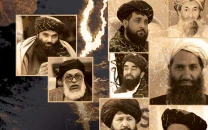Deep-rooted illiberal politics
The PPP has built its Sindhi ethnic nationalism on Bhuttoism, on the myths of political victimisation

The writer is a member faculty of contemporary studies at NDU Islamabad and can be reached at muhammadaliehsan1@hotmail.com
Eight years younger, a product of western education system and someone who was brought up by a mother that laid down huge sacrifices for democracy in this country, Bilawal Bhutto Zardari is hardly the Jacinda Ardern young political prototype that this country so badly needs. It is only when you shift your political loyalty away from regionalism, tribalism, ethnicity and religion towards the state that you become a true pluralist leader and a harbinger of cosmopolitanism. You can then, like Jacinda Ardern, advocate that not only justice but every human being matters. But if you are only ‘somewhere politician’ who every now and then keeps turning to Larkana and Garhi Khuda Buksh to mark your political presence and make political statements then you will never turn into an ‘anywhere politician’ who pulls the lever of the lifted draw bridges down to link all the communities within a given State. Bilawal Bhutto, as Gertrude Stein stated, should be able to carry his roots along all over the country and project his ‘state supporting’ good ‘civic nationalism’ that seeks politeness, calmness and order in society rather than be a ‘threatening ethnic nationalist’ who arrogantly challenges the government and the state as he goes about on his train march executing his public contact campaign. Like all the preceding years, his karwan remains ‘Karwan-e-Bhutto’, and if his current style of politics continues it seems least unlikely that he may ever lead a ‘Karwan-e Pakistan’.
The more he surrounds himself with ‘Bhuttoism’ the less enabled he would become to lead the ‘multiple nested identities’ in this country. If a nation and a state are two sides of a cricket ball then a regional leader will never be that seam that will stitch both the state and the nation together. Only a leader who is willing to supersede all his other identities (religious, ethnic, sectarian, tribal) with that of national identity (Pakistaniyat) can measure up to the challenge of making Pakistan one strong and composite nation.
Of particular interest is the statement of the young PPP leader on the issue of action taken by the government against the banned organisations’ leadership in the country. Accusing the government of complicity, he said, “I do not believe that you arrested them rather you took them in your protective custody so that they are not hit by an Indian aircraft.” The content and timing of this statement is most unsuitable and reflects poorly on all the political advisers of this young leader. The problem with the PPP is that it is becoming more nationalist that liberal. Bilawal Bhutto’s demonstration of an attitude of blind loyalty to Sindh rather than the attitudinal preference of deeper engagement and commitment to the state are troubling signs for the supporters of democracy in this country. The former attitude is a blind arrogance that is exclusivist and separatist in nature whereas the later attitude only exhibits the feelings of responsibility.
President Emmanuel Macron termed nationalism betrayal of patriotism. Followers of nationalists like PM Modi of India and Hasina Wajid of Bangladesh would feel proud of anything that their countries do. Their actions only create more exclusive and closed societies with minorities being their major victim. No one wants Bilawal Bhutto to take the nationalist route.
The PPP has built its Sindhi ethnic nationalism on Bhuttoism, on the myths of political victimisation, and on democracy being revenge against the military rule. Bilawal while leading the Karwan-e-Bhutto says, “NAB was created by General Musharraf and is still being run by the remnants of Musharraf.” Musharraf gave up power in 2008, and over the next eight years both the PPP and the PML-N did nothing to change NAB laws. Not because they couldn’t but only because they had so deeply entrenched themselves into the political system that they saw no other party to dislodge them from taking turns to rule this country.
Bhuttoism has thrived in Sindh. But any independent observer will vouch that it has posed more problems than solutions. The very low degree of social mobility and rampant poverty in Sindh speak volumes of the political rule of the slogan raisers of ‘Jiye Bhutto’. If this was the PPP’s liberalist rule in Sindh, people would rather wish Bilawal to stick to his roots and not export the ‘imperialist variant’ of this failed liberal rule outside and to other parts of the country.
When democracy drifts away from accountability, it gives birth to the politics of illiberalism. The calls for millions march and assault on Islamabad are still relevant because of lack of national level democratic accountability. The increased political polarisation in the country today stems from the one-sided government solution of democratic accountability.
The institutionalised power of the government must not submit in front of the religious and ethnic nationalists who continue to seek and promote the politics of illiberalism. The specter of street protests and all other methods of political blackmail will increase against the ever-increasing intensity of the accountability process being unleashed by NAB. The government must not give in to these forces of illiberalism because accountability in the end is necessary both for the eventual political stability as well as the state’s economic welfare.
Lastly, the political congregation in Larkana on 4th April, like always, will be impressive but will Bilawal Bhutto Zardari ever be able to politically root out of Sindh and be successful elsewhere in the country? NAB might just answer this question in the near future.
Published in The Express Tribune, March 31st, 2019.
Like Opinion & Editorial on Facebook, follow @ETOpEd on Twitter to receive all updates on all our daily pieces.













COMMENTS
Comments are moderated and generally will be posted if they are on-topic and not abusive.
For more information, please see our Comments FAQ